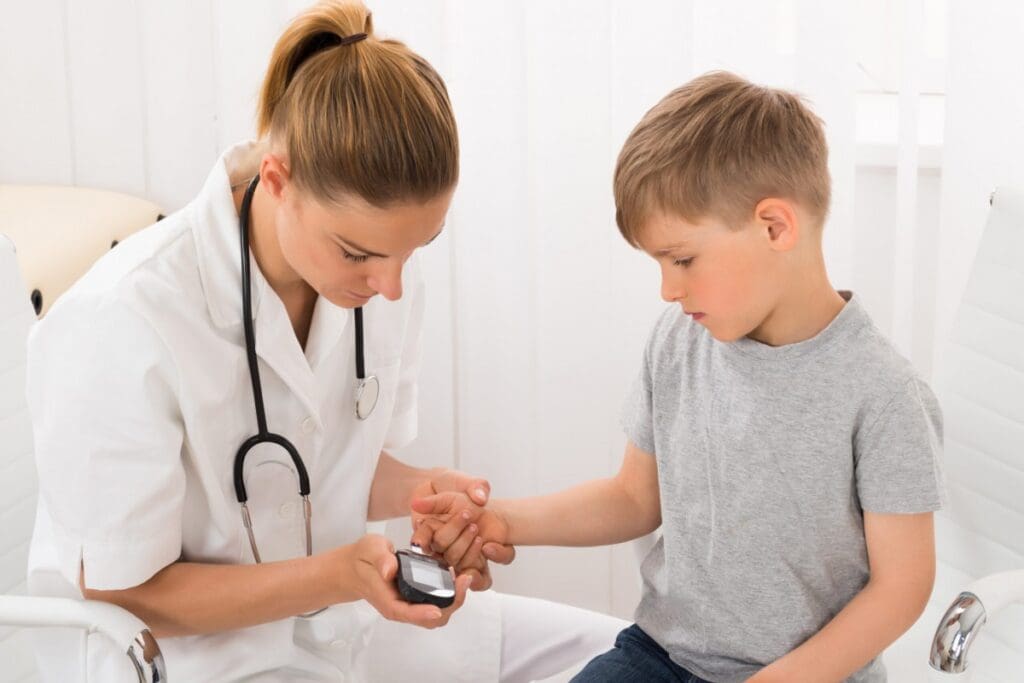Last Updated on November 24, 2025 by
Going to see a pediatric pulmonologist for the first time can be nerve-wracking, but knowing what to expect can help ease your worries. When you visit a pediatric pulmonologist near Albuquerque, the appointment usually involves a detailed check-up, including reviewing your child’s medical history, performing physical exams, and possibly running diagnostic tests such as lung function tests or imaging. Typically, the first visit can take about 2–3 hours. Our team in Albuquerque is experienced in guiding families through this process to ensure your child receives expert care and support.

This check-up will cover your child’s health history and symptoms. They will also do a physical exam and might do tests like lung function tests for kids over 5 and chest X-rays. The aim is to understand your child’s breathing problems well and create a good treatment plan.
It’s key to understand pediatric respiratory conditions for effective management. Respiratory issues in kids can be mild or severe. They are a big worry for parents. We’ll look at how common these issues are and their impact on kids’ health.
Childhood respiratory problems, like asthma, are more common than many think. Asthma affects about 8% of kids in the U.S. It makes airways inflamed, swollen, and can cause more mucus. This leads to symptoms like coughing, wheezing, or shortness of breath.
Many things can trigger these symptoms. Allergens, respiratory infections, and environmental factors are some examples. Managing these conditions means knowing what triggers them and using the right medicines.

Respiratory diseases are a top reason for kids to be hospitalized. The severity of these conditions can vary. Respiratory infections and asthma attacks are among the main reasons for hospital stays.
There are many reasons for these hospital visits. The severity of the condition, how well initial treatment works, and any complicating factors play a role. Healthcare providers need to understand these to manage conditions well and lower hospital admissions.
By understanding pediatric respiratory conditions, we can manage them better. This includes diagnosing, treating, and preventing these issues. We aim to support and guide families dealing with these conditions.
Finding the best pediatric pulmonologist in Albuquerque starts with knowing what’s important. LivHospital is a top choice, aiming for the best care in pediatric pulmonology. They use the latest academic protocols.
A great pediatric pulmonology practice offers comprehensive care. It has experienced staff and answers your questions well. Look for a doctor who is both skilled and caring.
“A pediatric pulmonologist who is not only skilled but also compassionate can make a significant difference in your child’s treatment journey,” says, a renowned specialist in pediatric pulmonology.
When picking a pediatric pulmonologist, ask important questions. These help you choose the right doctor for your child. Here are some key questions:
These questions help you understand the doctor’s expertise and their focus on personalized care.
It’s key to know your insurance when seeking specialized care. Check if the pediatric pulmonologist is in your network. Also, find out about any costs you might face.

Finding the right specialist is critical for your child’s health. Look at the doctor’s experience, the quality of their care, and how well they communicate. This will help you make a good choice.
“The right pediatric pulmonologist can provide not just medical care, but also the reassurance and support that families need during challenging times.”
Before your child sees a pediatric pulmonologist for the first time
, there are steps you can take. Preparing for this visit can seem tough, but with the right info, you can make it count.
It’s key to bring all important medical records to the appointment. This includes previous test results, hospital discharge summaries, and any relevant medical history. These documents help the pediatric pulmonologist understand your child’s health fully.
Also, bring a list of your child’s current medications, including dosages and frequencies. Don’t forget any recent test results, like X-rays or pulmonary function tests. This info is critical for the pediatric pulmonologist to assess your child’s health accurately.
Explaining the visit to your child in simple and reassuring terms can ease their anxiety. Use simple and positive language to describe what will happen. Being open and honest can make your child feel more at ease and cooperative during the exam.
Being well-prepared for your child’s first appointment with a pediatric pulmonologist ensures a productive visit. Our team is here to support you and your child with their respiratory health concerns.
When you visit a pediatric pulmonologist in Albuquerque, expect a detailed 2 to 3 hour evaluation. This thorough assessment aims to understand your child’s respiratory health. It helps the doctor make an accurate diagnosis and create a treatment plan.
The process starts with a detailed review of your child’s medical history. The doctor will ask about symptoms, past health issues, and treatments. This information is key to understanding your child’s respiratory problems.
Key aspects of the medical history review include:
Next, a thorough physical examination is conducted. The doctor will check your child’s overall health, focusing on respiratory signs. This includes listening to lung sounds and checking for distress.
A detailed physical examination is vital for spotting signs not apparent from the medical history alone.
Diagnostic testing is a key part of the evaluation. The tests depend on your child’s age and symptoms. For kids over 5, pulmonary function tests (PFTs) assess lung function. Other tests might include chest X-rays, sleep studies, or specialized tests for specific conditions.
After the evaluation, the doctor will discuss the findings with you. This is your chance to understand the diagnosis, ask questions, and plan the next steps in care.
“The initial consultation is a critical step in understanding your child’s respiratory health and developing a treatment plan that is tailored to their specific needs.”
By the end of the evaluation, you’ll have a clear understanding of your child’s condition and treatment options. This detailed approach ensures your child gets the best care for their respiratory health.
After your child’s first visit with a pediatric pulmonologist, you’ll get a clear diagnosis and a treatment plan made just for them. Our team will guide you every step of the way. We want to make sure you know what’s happening and feel supported.
The plan will fit your child’s unique needs. You’ll have follow-up visits every 3 to 6 months. This is to check on their progress and make any needed changes. We aim to give top-notch care, just like the UC Davis Pulmonary Clinic.
We’re all about working together for your child’s best health. We know how important follow-up care is. We’re here to help make the treatment process easy for you and your child.
At the first visit, expect a thorough check-up. This includes looking at your child’s medical history and doing a physical exam. They might also do some tests to understand your child’s health better and plan the best treatment.
To get your child ready, gather all important medical documents. Be ready to talk about your child’s symptoms and health history. Explaining the visit can make your child feel more at ease.
The goal is to get all the information needed for a correct diagnosis. This involves reviewing your child’s medical history, doing a physical exam, and possibly some tests. This helps in creating a good treatment plan.
Look for a pediatric pulmonology practice that offers full care. Make sure they have experienced staff and can answer your questions. We can help you find a qualified pediatric pulmonologist.
After the first visit, you’ll get a clear diagnosis and a treatment plan made just for your child. Follow-up visits will be scheduled to check on your child’s progress and adjust their care if needed.
Our team is here to support and guide you in managing your child’s respiratory condition. We will help create a treatment plan and offer ongoing support and advice throughout their treatment.
Respiratory problems like asthma are big health issues for kids. Asthma affects about 8% of children in the U.S. and is a top reason for hospital stays. Knowing about these conditions is key for parents and doctors.
Yes, we offer top-notch healthcare and support for international patients. Our team is here to support you and your child every step of the way.
Subscribe to our e-newsletter to stay informed about the latest innovations in the world of health and exclusive offers!